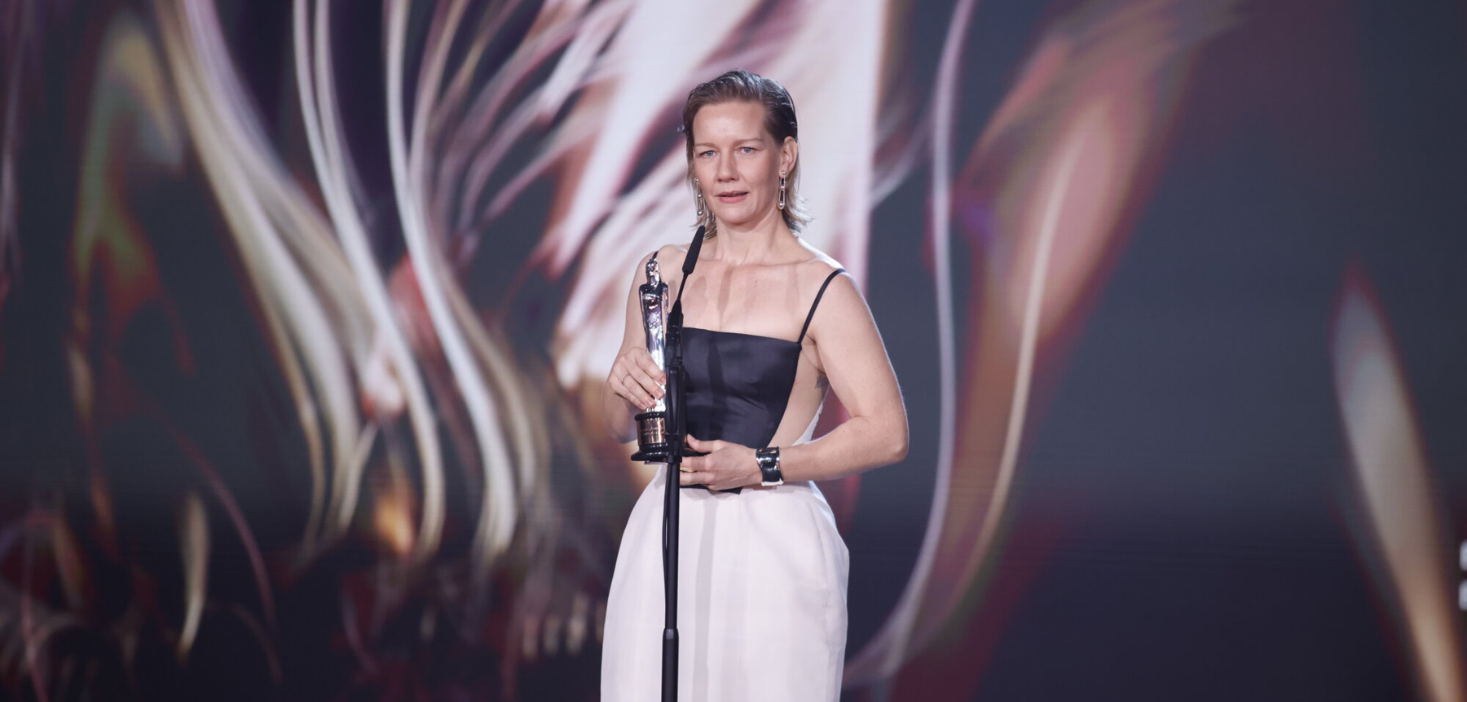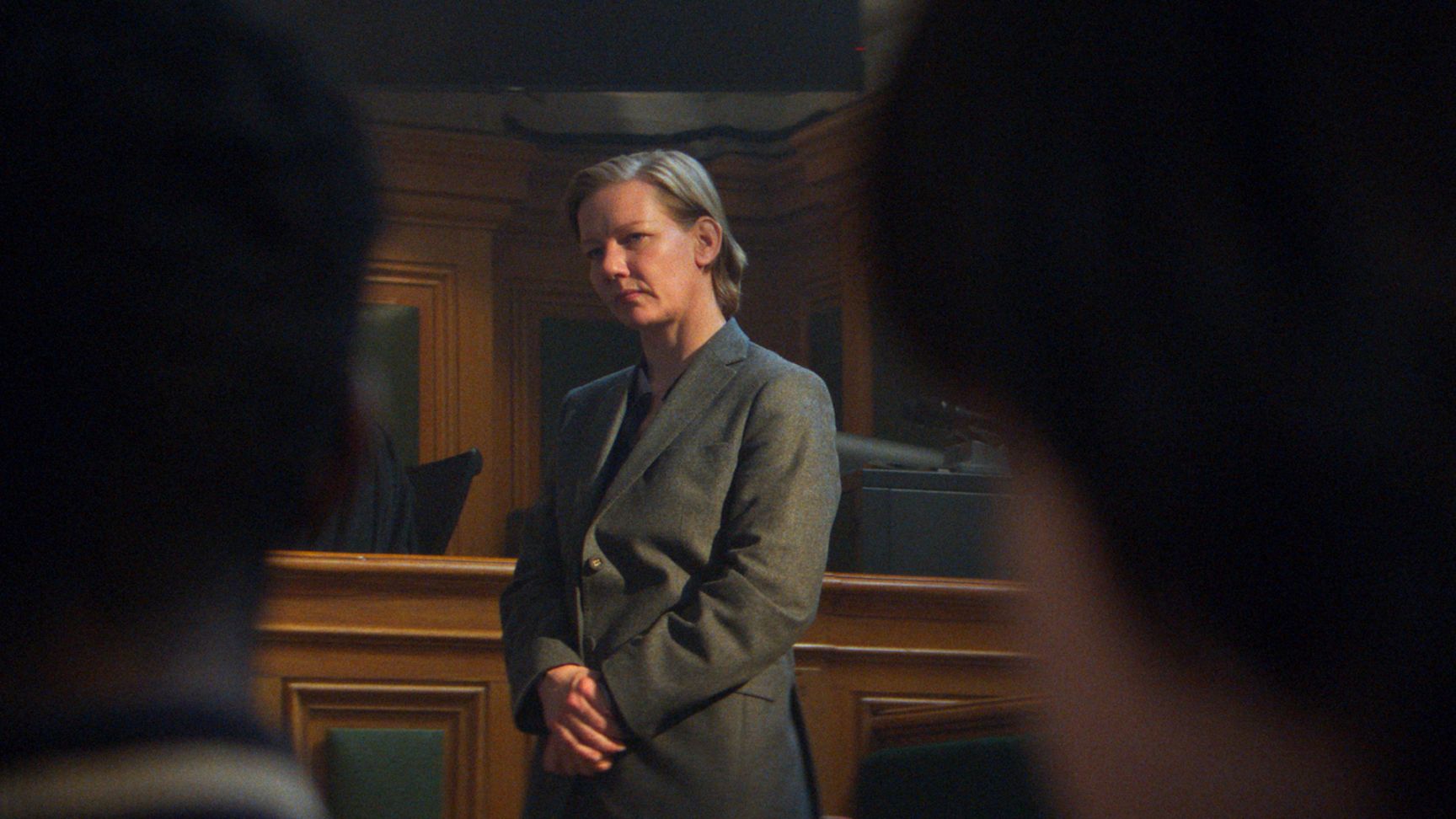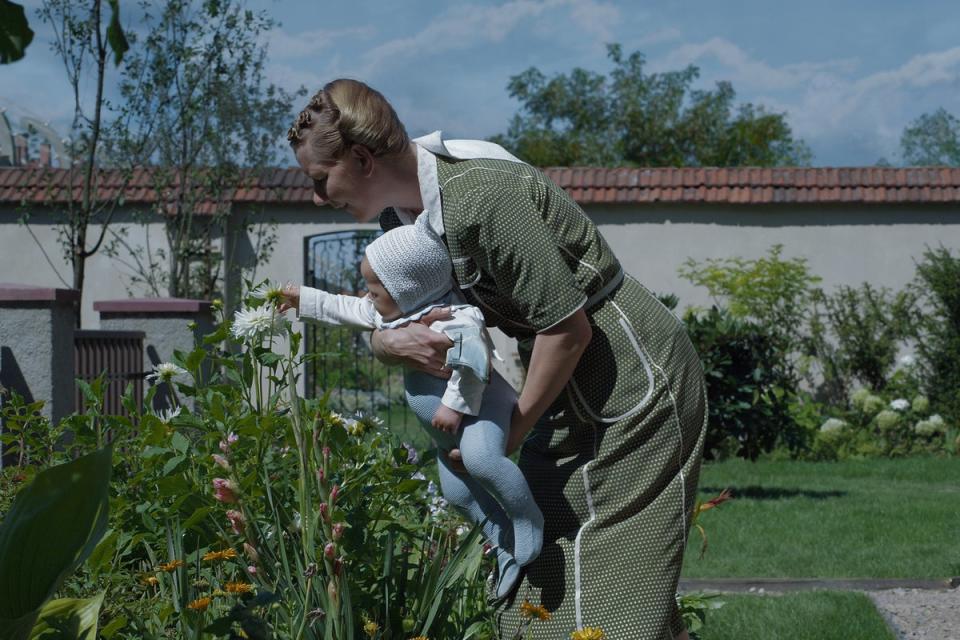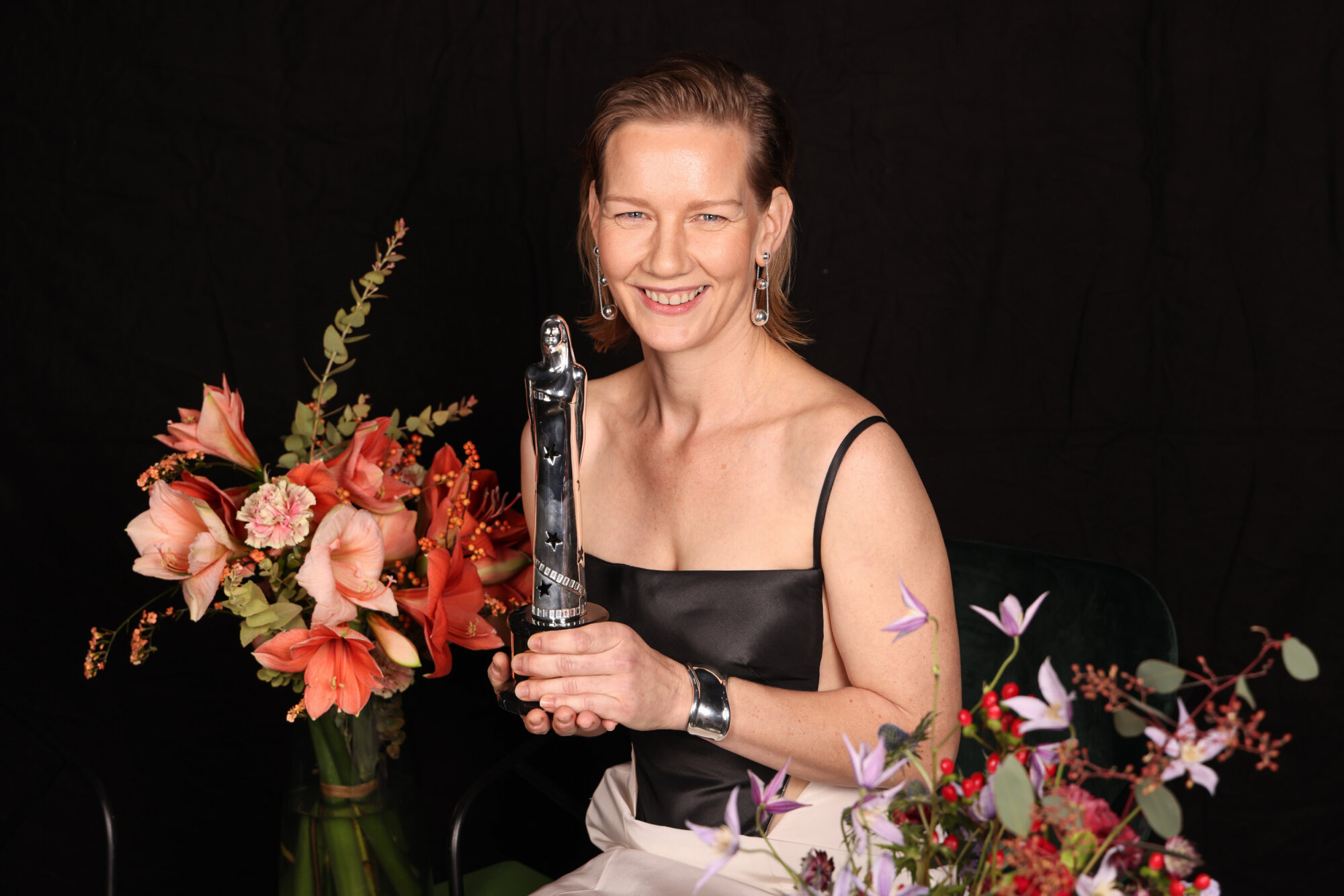Sandra Hüller, Oscar nominee for best actress: “Every role choice is political”
“It’s so weird!” Seated in the middle at a long rectangular table in a small room in a luxury hotel in Berlin, with her assistant watching from a corner, Sandra Hüller repeats the sentence several times throughout the 30-minute interview. Surrounded by ten journalists from different countries, with me being the only one from Romania, Sandra Hüller appears in front of the press as a double nominee – a rare feat – for the European Film Academy Awards 2023, taking place on December 9.
The German actress, who became widely known for her role in Toni Erdmann (dir. Maren Ade, 2016 – filmed mainly in Romania), is bombarded with questions – everyone knows that time is limited and wants to have their chance to ask at least one.
She answers briefly, to the point, sometimes taking a short pause, and each time she looks her interlocutor in the eye. The curiosities come in no particular order – journalists intervene when they feel the previous answer has ended, and sometimes even before. The actress has to turn her head from one side to the other, quickly grasp and understand the questions, and express the most accurate thoughts possible.
Aware that her words can reach anywhere, she sometimes stops halfway through an idea and smiles, “I think it’s too much.” “No, not at all,” the reporters react, laughing, hoping to get quotable statements.
Sandra Hüller stars in both Justine Triet’s Anatomy of a Fall (winner of the 2023 Palme d’Or) and Jonathan Glazer’s The Zone of Interest (winner of the Grand Prix at Cannes 2023). In the former, she plays a German writer (Sandra Voyter) suspected of killing her French husband and forced to defend herself in court, and in the latter, she portrays Hedwig Höss, the wife of Nazi commandant Rudolf Höss (Christian Friedel).
“Both films are extremely important to me, personally and professionally. As an actor, they took me to a place I never thought I could go. I’m very lucky to have worked with these two teams and to have had the chance to make these two films, which explore completely different but equally serious topics,” says the actress.
No one asks her if she expects to win because victory is almost certain – in a few hours, she would get on stage to receive the Best Actress award for her performance in Anatomy of a Fall. Instead, there is an emphasis on a potential Oscar nomination. It later proved that the journalists had valid reasons – on January 23, the Academy of Motion Picture Arts and Sciences announced its nominations, and Sandra Hüller is among them (nominated for the same role), alongside Annette Bening, Lily Gladstone, Carey Mulligan, and Emma Stone.

On this December day, however, Sandra Hüller seems reluctant to talk about it: “I can’t say anything to that. It’s out of my control. Would it be important? I don’t know. I mean, it would be very exciting. But I don’t know how to deal with that possibility in my mind right now. It’s too much. It’s a system I don’t understand. I don’t know its rules. I don’t know what you have to do to be visible.”
Journalists want to know details about each of the two roles, but the first questions focus on Justine Triet’s film. “When we had a screening in Romania (i. e. the film was shown as part of Les Films de Cannes à Bucarest and was followed by an online Q&A), someone asked me if I would say it was a film about a woman accused of killing her husband or if it was a story about a son whose mother is accused of killing his father. I think this perspective is very important. Also, I believe that Justine and Arthur (i.e. Justine Triet and Arthur Harari, the film’s screenwriters) never wanted to lose the boy’s point of view, who does not know. He doesn’t know until the end, he says: “I can’t imagine my mom doing it, but my dad, yes.” So it’s about your own imagination, about what you are capable of thinking. Most of the time, when I’m working on a role, I try not to think only about the character, I always think about the whole thing. I don’t know, maybe it’s a professional reflex. That’s why it wasn’t so difficult, because we wanted to say something else. We wanted to say something about finding out the truth. So my own struggle with this question as an actor would influence Sandra’s face,” explains the actress, who agrees with what a friend told her, namely that Anatomy of a Fall is a true feminist film.

She admits that she, too, didn’t know whether Sandra Voyter was guilty or not. “I struggled with it for a few days and then I decided it wasn’t important. I wanted to say every line so people would believe what I was saying. And even if someone were to do such a thing that she is accused of, that person might still believe in court that they are innocent. I just tried to be believable,” she elaborates.
Sandra Hüller states that what she appreciates about Justine Triet’s way of working is that she encourages dialogue, creativity, and the possibility of making mistakes: “She offers a lot of creative freedom and a lot of possibilities to maybe not do the right thing. But she would never say it’s bad. Some people actually do that: ‘That was bad. Let’s do it again.’ But that doesn’t give you the feeling that you should show something more; it’s not very encouraging. She gives all sorts of possibilities. You can make mistakes and it will give much more power to the things that you do next. She wants to find the way through the story together with everyone. She doesn’t stand somewhere and just gives directions. For an actor like me, it’s a very good thing because I can make the character as rich as possible. And that’s really nice.”
She initially turned down the role in The Zone of Interest
This strategy, of not just relating to the character but taking the whole film into account in building the role, was also applied to The Zone of Interest, a project she initially turned down because of the subject matter and in particular the fact that she had to play Hedwig Höss (“Would you wear a Nazi uniform?” she asks a journalist as a way to explain her reluctance).
“With Hedwig Höss, I had to find a way to be in this project without truly playing a character, without empathizing with her. So I used all the elements that were there: the incredible hair and costumes, the house and the garden, the camera decisions. All these things had an influence on my presence in this experiment. I kind of worked from the outside, from what I wanted to show. Normally, I don’t work from what I want to show but from what I want to experience. So I had to find other ways, for example, a physical one, trying to figure out how someone who had so many children (i. e. five), who works in the garden, who might carry a burden she is not aware of, would move,” says Sandra Hüller.

Asked how Jonathan Glazer made her feel at ease, the actress replies that the British director didn’t want that, on the contrary. “He was very honest, but he didn’t make me feel at ease. We were very aware that there would be no easy moments during filming. Never. It’s such an important thing to show and make people feel. That’s what this film does, it makes people feel the horror that took place, makes them see how easy it is to go to the place where the Höss family lived (i.e. in a house right next to the Auschwitz camp) and close your eyes to everything that’s happening next door. Let’s be open about it, the same is true about the present, about what’s happening at European borders, or the politics in our countries. We do a lot of things for convenience, and these were things we talked about constantly. So I had a lot of respect for his point of view and the artistic decisions he made. He didn’t want to have a dramatic story about a fascist couple and use the Holocaust as a canvas. That would have disgusted me as well, to be honest. So he chose another way. He showed the dullest, most basic, banal lives that you can imagine, people just wanting a little bit more: to have a nice garden, for the kids to be at peace, and not to care about what’s happening next door. That’s what he did. And I found it appropriate.”
“I think what he wanted to show is how thin the line is between us and this couple. We have a lot of ignorance going on in our lives in order to live a convenient and sort of peaceful life. We tend to look the other way. For him, it was important not to show the feelings of these people but to show how much we have in common with them so that when we watch the film we make a connection to ourselves. I feel it’s very important that he tried to do that,” she adds.
Even if we didn’t see the cameras, we never forgot they were there.
Sandra Hüller also talks about the atypical system Jonathan Glazer used in the shooting process, where he had hidden cameras installed in the room they would film, without revealing their location to the actors, to create the feeling of a video-surveilled space.
“Even if we didn’t see the cameras, we never forgot they were there. It would have been weird to find yourself in a house with Nazi memorabilia and act as if the camera wasn’t on. This surveillance system they built had a strong psychological effect on both Christian (i.e. Christian Friedel, the actor who plays Rudolf Höss) and me and everyone else involved because it creates a kind of burden, a responsibility that you feel. You are very aware of that fact, of the judgment you impose on yourself, which is somewhat outside because you don’t know about the artistic decisions that are made behind the camera, you don’t know what kind of frame will be used. You don’t know how close the cameras are. In a way, you are left completely alone with the topic and your thoughts on it. And with your partner, of course, which creates a strong connection because you have to rely on each other. You are in this together, so it was also a sort of spiritual experience, if I may say so. Jonathan Glazer opened up the space for something present that wasn’t just technical. I can’t even say what it is, but I had a strong feeling that we (i.e. she and Christian Friedel) were both sharing something unspeakable at that moment,” says the actress.

When talking about these two major roles she played in some of the most important films of 2023, Sandra Hüller confesses that she learned something from each. From Sandra Voyter, she says she would like to have “the boldness to do things the way she does”. From Hedwig Hess, she didn’t necessarily learn something, but talking to Jonathan Glazer about the character did make her understand something fundamental about people: “Can someone, who accepts the death of millions of people next door, truly love their children, their dog, their garden? I don’t think so. I don’t think someone who wants one part of humanity dead is able to love another part of it. It’s just not compatible.”
The actress says that there are several reasons why she accepts a role, but she is convinced that every choice is a political one: “Even if you say you don’t want to deal with politics now because you need a break and just want to do something easy for yourself, that’s still a political decision. I think that’s always been the case – we need films that take risks, and we need people who have a strong voice and dare to articulate it.”
“The road to that decision is sometimes a bit bumpy. But it’s always a political decision, related to the story you want to be a part of. Sometimes it’s just about a place I want to go. Sometimes it’s a director I want to get to know. Sometimes it’s a partner. But I think most of the time it’s something I haven’t been involved in or thought about before. So something that I find interesting, where I can get something out of it. And when I accept a role, I’m totally in. There’s nothing that can hold me back,” she explains her choices.

At the end of the interview, Sandra Hüller is asked about how she perceives the situation of actresses in the film industry and the risk that after a certain age, they may not be offered strong leading roles. She gives a firm and clear answer: “You know, I always have theater. Nobody cares what you look like in the theater. And I don’t care about that either. I think that even in America there are many examples of women my age (i. e. the actress was born in 1978) or older who have a lot of work now. It’s a very good development and has to do with the decision of many women colleagues not to change their faces, not to change their bodies to meet the expectations that the male gaze would have about them. It’s up to each of them to say up front that they don’t want to do anything to satisfy someone’s fantasies.”
After half an hour, the actress’s assistant steps in and announces that time is up. Relieved, Sandra Hüller leans over the table, as a gesture of exhaustion, and says one last, “It’s so weird!” She thanks us, stands up, and as we leave the room, opens the window for a breath of fresh air.
***
“Anatomy of a Fall” was released in Romania by Voodoo Films on November 3, 2023, and can still be seen in a few screenings. Distributed by Bad Unicorn, “The Zone of Interest” will hit local theaters on February 16. Both films are nominated for Best Picture and four other Oscars this year. The gala will be held on March 10.
Photo: European Film Academy
Journalist and film critic. Curator for some film festivals in Romania. At "Films in Frame" publishes interviews with both young and established filmmakers.
